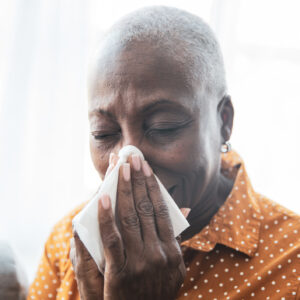Protect Yourself Against Surging Viruses
January 10, 2024 | Covid-19, Healthy lifestyles, Prevention of Illness and Management of Chronic Conditions

You may be noticing an uptick in people sneezing, sniffling, and coughing these days. That’s because respiratory viruses are surging right now, including in California. Flu, Covid, and RSV are spreading, and cases are expected to keep rising.
Part of the problem is that many people, seniors included, are not getting vaccinated. A CNN article reported that only “17% of adults 60 and older have gotten the new RSV vaccine. Less than half of adults and children have gotten the flu vaccine this season.” And those numbers were recorded before the holidays, when people gather more often, which explains why cases are expected to keep growing.
“It’s a wave of winter respiratory pathogens, especially respiratory viruses,” Dr. Peter Hotez, dean of the National School of Tropical Medicine at the Baylor College of Medicine told CNN. “So it’s Covid, it’s flu, and we can’t diminish the importance of RSV. It’s a triple threat, and arguably a fourth threat because we also have pneumococcal pneumonia, which complicates a lot of these virus infections.”
Close to home, “COVID-19 infections are way up in San Diego County based on the latest wastewater surveillance data,” reported KPBS. “The most recent data from Dec. 27 show a spike in viral load as high as January 2022, when the omicron surge hit the region.” The article notes that hospitalizations in San Diego County are not as high as they were then, but an expert at UC San Diego Health “said he expects to see an increase in hospitalizations in the coming weeks.” Almost half of all current Covid infections nationwide are caused by the JN.1 variant.
It’s never too late to get vaccinated—and/or boosted—against Covid, the flu and RSV. Vaccinations are important for everyone, but particularly seniors and people whose immune system may be compromised. We all learned during the pandemic to wear masks, follow good hygiene, and stay home if we’re sick. Those practices are still very important.
Protecting the health of our clients and staff is our first priority. Our best practices include everything from personal infection control and prevention to staying up to date on federal, state and county recommendations plus protecting client safety upon discharge from a hospital or congregate living setting. Learn about our C.A.R.E. platform, the best practices that guide all of our care.

